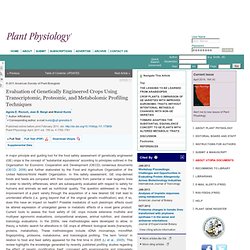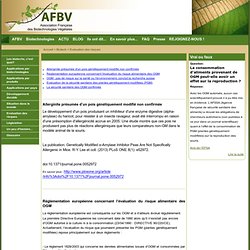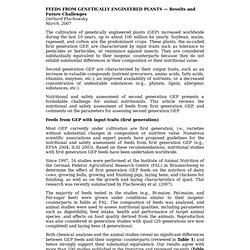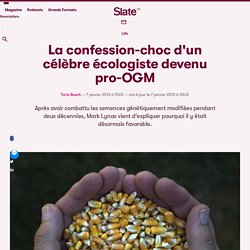

AFBV: Biotechnologie végétale. Evaluation of Genetically Engineered Crops Using Transcriptomic, Proteomic, and Metabolomic Profiling Techniques. A major principle and guiding tool for the food safety assessment of genetically engineered (GE) crops is the concept of “substantial equivalence” according to principles outlined in the Organization for Economic Cooperation and Development (OECD) consensus documents (OECD, 2006) and further elaborated by the Food and Agriculture Organization of the United Nations/World Health Organization.

In this safety assessment, GE crop-derived foods and feeds are compared with their counterparts from parental or near isogenic lines in order to identify differences, which are subsequently evaluated with respect to safety for humans and animals as well as nutritional quality. The question addressed is: may the improvement of a plant variety through the acquisition of a new desired GE trait lead to unintended effects (i.e. going beyond that of the original genetic modification) and, if so, does this have an impact on health? Barley Maize In this context, the work of Barros et al. (2010) is important. AFBV: Biotechnologie végétale. Allerginite présumée d’un pois génétiquement modifié non confirmée Le développement d'un pois produisant un inhibiteur d'une enzyme digestive (alpha-amylase) du haricot, pour résister à un insecte ravageur, avait été interrompu en raison d'une présomption d'allergénicité accrue en 2005.

Une étude montre que ces pois ne produisent pas plus de réactions allergéniques que leurs comparateurs non-GM dans le modèle animal de la souris. La publication: Genetically Modified α-Amylase Inhibitor Peas Are Not Specifically Allergenic in Mice. R-Y Lee et coll. (2013) PLoS ONE 8(1): e52972. doi:10.1371/journal.pone.0052972 En savoir plus : Réglementation européenne concernant l’évaluation du risque alimentaire des OGM La réglementation européenne est conséquente sur les OGM et a d’ailleurs évolué régulièrement. . - Le règlement 1829/2003 qui concerne les denrées alimentaires issues d’OGM et consommées par l’Homme et/ou l’animal.
FEEDS FROM GENETICALLY ENGINEERED PLANTS. Mycotoxin contamination of some GE crops is lower than non-GE, which may be one exception to their substantial equivalence.

For example, Bt maize is less severely attacked and weakened by the corn borer and hence might have a greater resistance to field infections, particularly by Fusarium fungi, which produce mycotoxins. Evidence of reduced mycotoxin contamination in GE crops has been demonstrated in some but not all cases, as summarized by Flachowsky et al. (2005). In long-term studies, numerous researchers investigated the influence of levels of corn borer infestation of isogenic and Bt hybrids on mycotoxin contamination. Most researchers concluded that a lower level of mycotoxin contamination was observed in the transgenic hybrids, despite the considerable geographical and temporal variation observed. Feeds from GEP with output traits (second generation) Second generation GEP are characterized by either: an increased content of desirable/valuable traits, such as Conclusions. La confession-choc d'un célèbre écologiste devenu pro-OGM. Temps de lecture: 4 min Si les aliments génétiquement modifiés vous font peur, Mark Lynas fait sans doute partie des gens que vous pouvez remercier.

De son propre aveu, le dynamisme du mouvement anti-OGM, né au cours des années 1990, lui doit beaucoup et, en 2008, il expliquait encore comment l'égoïsme et la cupidité des multinationales du transgénique allaient mettre en péril la santé des humains et celle de la planète. Grâce aux efforts de Lynas et de ses homologues, tous les gouvernements du monde –en particulier ceux d'Europe de l'Ouest, d'Afrique et d'Asie– ont freiné les recherches sur les OGM et, à l'instar de Greenpeace, de nombreuses ONG ont banni tous les dons d'aliments génétiquement modifiés.
Mais Lynas a changé d'avis –et il compte bien le faire savoir. Son laïus prononcé, jeudi 3 janvier, à l'occasion de l'Oxford Farming Conference ne pouvait être plus clair: au sujet des OGM, il était dans l'erreur la plus totale. «Je voudrais commencer par présenter mes excuses. Torie Bosch.